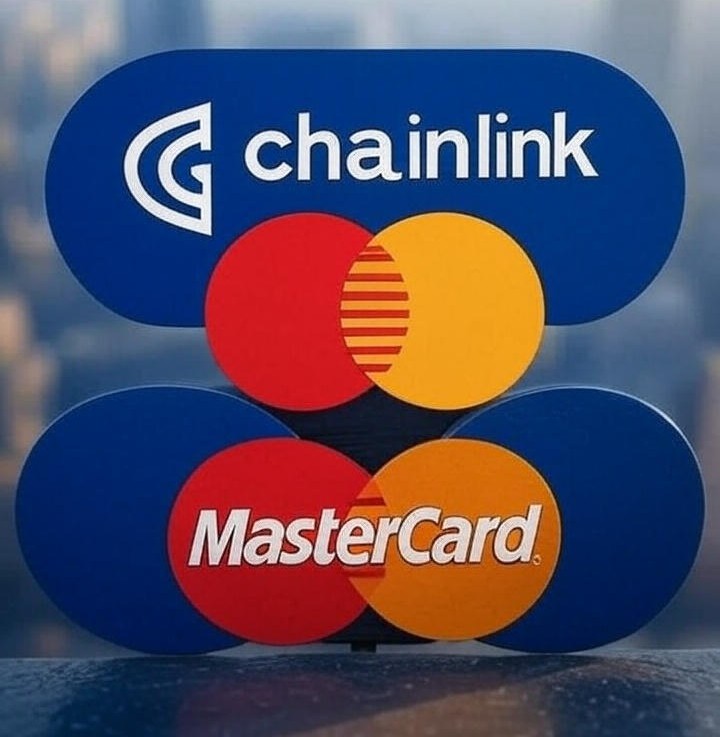In a major move that signals the growing acceptance of digital currencies Chainlink a leading blockchain network and Mastercard one of the world’s largest payment companies have announced a new partnership. This collaboration focuses on integrating cryptocurrency with traditional finance creating a powerful link between blockchain technology and global financial systems.

What is Chainlink?
Chainlink is a decentralized network that connects blockchains with real-world data. Think of it as a bridge between crypto and the real world. It helps smart contracts (self-executing agreements on the blockchain) get accurate and reliable information from outside the blockchain, like weather data, sports results or stock prices.
Chainlink is already trusted by many crypto projects and has become a key player in the Web3 ecosystem – a vision of the internet where users control their own data and money.
What is Mastercard?
Mastercard is a global payments company that helps people and businesses send and receive money. Whenever you swipe a Mastercard credit or debit card you are using their payment network.
Mastercard has millions of users around the world and works with banks, merchants and governments. In recent years it has shown increasing interest in digital currencies and blockchain technology exploring how these innovations can improve financial services.
The Big News: A Strategic Partnership
In July 2025, Chainlink and Mastercard announced a partnership aimed at integrating cryptocurrencies into mainstream financial systems.
The focus of this partnership is to use Chainlink’s Cross-Chain Interoperability Protocol (CCIP) to help Mastercard’s payment solutions connect with multiple blockchains.
This means that Mastercard can now interact with different crypto networks in a secure and smooth way making it easier to use digital currencies for real-world payments.
What Is CCIP?
CCIP, or Cross-Chain Interoperability Protocol is Chainlink’s system that allows different blockchains to talk to each other. Normally blockchains work in silos – Bitcoin doesn’t talk to Ethereum, Ethereum doesn’t talk to Solana and so on.
CCIP helps break down these walls allowing information and tokens to move across blockchains. This is a big step towards making crypto more usable, scalable and user-friendly.
With CCIP Mastercard can build systems that work across various crypto networks, increasing flexibility and security.
Why Is This Partnership Important?
Here are a few reasons why this partnership matters:
1. Mainstream Acceptance
When a global giant like Mastercard partners with a blockchain project it shows that cryptocurrency is becoming more accepted in the traditional financial world. This helps increase public trust in digital assets.
2. Bridging the Gap
Right now many people still find it hard to move money between their bank accounts and crypto wallets. This partnership could help make the process easier, faster and more secure.
3. Improved Security
By using Chainlink’s trusted technology, Mastercard can ensure that its crypto-related services are secure and reliable which is crucial for large-scale financial operations.
4. Better Cross-Border Payments
Sending money across countries can be slow and expensive. With blockchain integration, Mastercard could offer faster and cheaper cross-border transactions, especially in developing nations.
Real-World Uses of This Partnership
This is not just a technical upgrade – it has real potential to impact our daily lives. Here are some examples of what could be possible:
- Crypto Payments at Stores: Imagine paying for groceries or coffee with Bitcoin or Ethereum using your Mastercard – seamlessly.
- Faster International Transfers: Sending money to family overseas could become instant and low-cost.
- Digital ID and Verification: Mastercard could use blockchain for identity verification, reducing fraud.
- Tokenized Assets: In the future, you might hold tokenized stocks, property, or even art on your Mastercard-backed crypto wallet.
Growing Trend of Crypto-Finance Partnerships
This is not the first time a major financial institution has entered the crypto world.
- Visa is working on stablecoin settlements.
- PayPal offers crypto buying and selling.
- Fidelity and BlackRock are creating Bitcoin ETFs and other investment tools.
These developments show that traditional finance is no longer ignoring cryptocurrency – it’s embracing it.
What This Means for the Future
The Chainlink-Mastercard partnership marks another step toward a future where digital currencies are part of everyday life. Here’s what we can expect:
1. More Innovation
With big companies working together, new products and services will come faster – from crypto credit cards to blockchain-powered insurance.
2. Wider Adoption
People who’ve never used crypto before might start using it because it’s integrated with platforms they already trust, like Mastercard.
3. Regulatory Pressure
As crypto becomes more mainstream, governments will likely push for stronger regulations. Companies like Mastercard can help shape rules that protect users while supporting innovation.
Final Thoughts
The partnership between Chainlink and Mastercard is a powerful signal that cryptocurrencies are here to stay – and they are moving into the hands of millions of users.
With Chainlink’s blockchain expertise and Mastercard’s global reach the two are building a future where digital currencies are more accessible, secure and useful for everyone.
As more partnerships like this emerge the line between traditional finance and digital finance will continue to blur, creating a more connected and inclusive financial world.
In Simple Words: Chainlink helps connect blockchains to real-world data. Mastercard helps you pay for things. Together they are trying to make it easier for people to use cryptocurrencies like normal money – safely and easily.
It’s a big step for the future of money.
